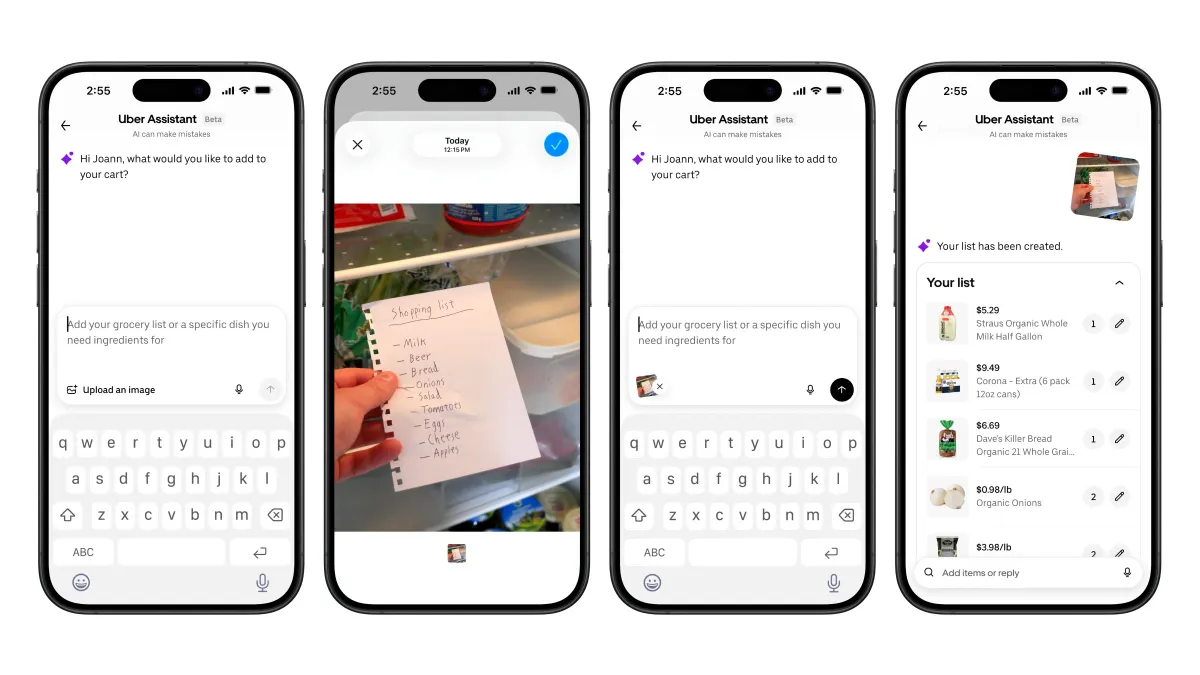Generative and agentic AI’s power to transform experiences is top of mind among executives at Amazon, Target and Walmart.
John Furner, CEO of Walmart U.S. and future companywide CEO, called the technology a “strong enabler” of its digital experience on an earnings call last week. Amazon CEO Andy Jassy said that agentic commerce is poised to change customer experience during a late October earnings call.
The different companies are each taking their own approach to the technology.
Walmart has Sparky, its in-house AI assistant, and is partnering with OpenAI to let shoppers purchase items from Walmart using ChatGPT. Amazon has its conversational assistant Rufus, while Target is exploring AI’s potential as well with the recent launch of an AI holiday gift finder and this week’s beta launch of its own app on ChatGPT.
While there have been a lot of “exciting announcements” in recent weeks, all three companies are still in the early stages of their generative AI strategies, said Brad Jashinsky, director analyst at Gartner.
These exploratory efforts can offer lessons for other retailers to follow once AI becomes more mainstream. The ways the three retail giants build their investments on a solid CX foundation, manage the pros and cons of working with third parties, and invest in the experience behind the scenes can all provide blueprints for future adoption.
Basics are more important than technology
One of the most important lessons about generative AI experiences is that they’re a long-term investment, according to Jashinsky.
The emergence of agentic AI is similar to the early days of e-commerce, according to Jashinksy. There will be a huge opportunity in the years ahead, but in the meantime companies need to continue executing well on their existing experiences.
“AI is going to have a huge impact, but in the short term, it's not going to be a significant sales driver,” Jashinsky said.
This offers an immediate advantage to Walmart and Amazon, which are investing in the technology across a streak of strong quarters, compared to Target, which is putting a greater emphasis on improving its baseline experience as it pursues a turnaround, according to Jashinsky.
Companies need to balance their resource allocations so that they’re not distracted by AI advancements, according to Jashinsky. This advice applies to smaller companies as well — don’t invest in AI simply for the sake of new technology, but do so because it advances business interests.
Walmart’s associate-facing AI is supporting its traditional in-store experience. Walmart’s workers use the technology for task management and translation support, and as of July, associates were asking the company’s conversational AI tool 3 million questions per week.
“Walmart is setting a new standard for omnichannel retail by integrating automation and AI to build smarter, faster and more connected experiences for customers while enabling our associates to deliver even greater value at scale,” John Rainey, EVP and CFO at Walmart, said during an earnings call last week.
Amazon is investing in AI as a way to elevate an already strong digital experience. Amazon is great for people who know what they want to buy ahead of time, but it doesn’t have salespeople ready to offer help like a store would, Jassy said. AI agents can fill their role.
“I think AI and agentic commerce are going to change the experience online where that experience of narrowing what you want when you don't know, is going to get better online than it even is in physical environments,” Jassy said on an earnings call last month.
Target’s latest earnings call focused on how it’s improving in-store experiences and is taking a more measured approach to AI, but even if Target seems to be lagging, that doesn’t mean it should be counted out.
“It's not like Target can't catch up at all,” Jashinsky told CX Dive. “All of these companies right now are learning a lot about how customers are actually utilizing these tools.”
What happens to the retailer with third-party agents?
Third-party AI agents are shaping up to play a major role in customer experience. However, the way this will affect customer loyalty remains to be seen.
Retailers who sell through third-party platforms give up some level of control over the experience, according to Jashinsky. It’s also unclear whether the retailer or the AI platform will earn the praise for a great experience or take the blame for a poor one — making the retailer’s relationship with the customer murky.
“Retailers can almost lose that special sauce that they have and become a fulfiller,” Jashinsky said. “That's the one worry that a lot of retailers are talking to us about. They want all of the eyeballs and the business that comes from Google and ChatGPT, but what are they giving up for that?”
Target and Walmart are exploring a different approach to third-party partnerships with OpenAI.
Amazon is open to working with other companies in the future, but the third-party agentic AI experience still needs work, according to Jassy.
Walmart will make its products available on ChatGPT’s Instant Checkout feature, joining businesses like Etsy and Shopify on the platform. Customers can search through items using the chatbot, then make single-item purchases directly on the platform.
Target’s app on ChatGPT that will let customers purchase multiple items in a single transaction, shop fresh food products, and select drive up, pick up, or shipping fulfillment options.
Each retailer’s angle has its benefits, and Walmart’s approach casts the widest net, according to Jashinsky. Customers who ask ChatGPT for general product advice may end up transacting with Walmart even if they hadn’t previously considered checking its site or stores.
“That's a great way to be able to tap into the millions of users that are going to ChatGPT for shopping advice, especially for those bigger ticket items,” Jashinsky said. “You're still reaching consumers, but in different parts of the customer journey.”
Target’s approach will create a more fully fleshed-out customer experience, but containing that experience within an app will limit its reach, according to Jashinsky. It’s still early days for the ChatGPT app store, and many users may not even realize it’s an option.
“I think that it'll be interesting to see if they eventually add in Instant Checkout and integrate on that side,” Jashinsky said.






















